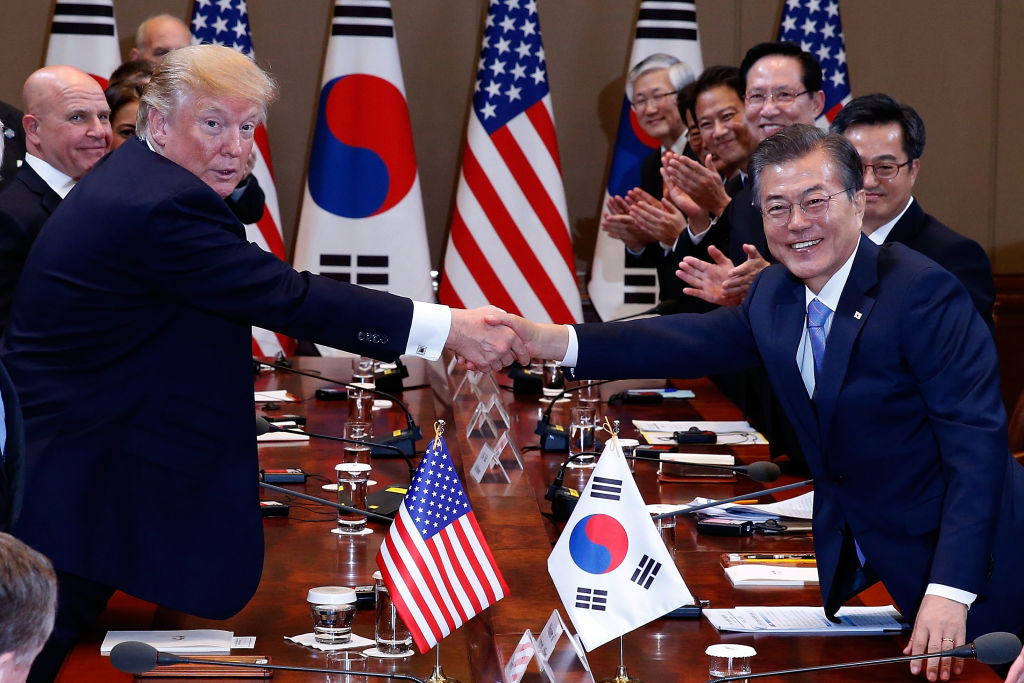The White House announces its revised trade deal with South Korea


A free daily email with the biggest news stories of the day – and the best features from TheWeek.com
You are now subscribed
Your newsletter sign-up was successful
On Tuesday eveninig, White House officials announced that the Trump administration had successfully renegotiated the six-year-old South Korea-U.S. trade agreement (KORUS), giving President Trump his first major trade deal since being elected. In return for exemption from Trump's 25 percent tariff on steel imports and 10 percent tariff on aluminum, South Korea agreed to limit its U.S. steel exports to 2.68 million tons a year, or roughly 70 percent of its average exports from 2015 to 2017; allow twice as many U.S.-made cars, 50,000 per manufacturer, into Korea without meeting local safety standards; and extend for 20 years a 25 percent tariff on South Korean pickup trucks exported to the U.S. The Trump administration also said it was wrapping up a nonenforceable side deal to deter currency devaluations by South Korea.
An unidentified senior administration official told reporters that the "historic" agreement in principle "is visionary and innovative, and it underscores a pattern of failure by previous administrations to negotiate fair and reciprocal trade deals." Trump had threatened to rip up KORUS if South Korea did not renegotiate, and the threatened steel tariff provided another carrot and stick for U.S. negotiators. It's not clear Trump's "America First" strong-arm tactics will work with larger trading partners like China, Canada, and Mexico. And not everyone is as impressed as the White House with the deal.
For example, Ford and General Motors sent fewer than 10,000 cars each to South Korea last year, well short of the new 50,000 cap, and no Korean company currently exports pickup trucks to the U.S. "The expanded quota on autos allows in cars we don't want to ship," Phil Levy, a senior economist in President George W. Bush's White House, tells The Washington Post. "The extended tariff on trucks blocks pickups the Koreans are not exporting. And the limitation on Korean steel exports will make life more difficult for all the U.S. manufacturers who use Korean steel. ... In what way does this help?"
The Week
Escape your echo chamber. Get the facts behind the news, plus analysis from multiple perspectives.

Sign up for The Week's Free Newsletters
From our morning news briefing to a weekly Good News Newsletter, get the best of The Week delivered directly to your inbox.
From our morning news briefing to a weekly Good News Newsletter, get the best of The Week delivered directly to your inbox.
A free daily email with the biggest news stories of the day – and the best features from TheWeek.com
Peter has worked as a news and culture writer and editor at The Week since the site's launch in 2008. He covers politics, world affairs, religion and cultural currents. His journalism career began as a copy editor at a financial newswire and has included editorial positions at The New York Times Magazine, Facts on File, and Oregon State University.
-
 How to Get to Heaven from Belfast: a ‘highly entertaining ride’
How to Get to Heaven from Belfast: a ‘highly entertaining ride’The Week Recommends Mystery-comedy from the creator of Derry Girls should be ‘your new binge-watch’
-
 The 8 best TV shows of the 1960s
The 8 best TV shows of the 1960sThe standout shows of this decade take viewers from outer space to the Wild West
-
 Microdramas are booming
Microdramas are boomingUnder the radar Scroll to watch a whole movie
-
 TikTok secures deal to remain in US
TikTok secures deal to remain in USSpeed Read ByteDance will form a US version of the popular video-sharing platform
-
 Unemployment rate ticks up amid fall job losses
Unemployment rate ticks up amid fall job lossesSpeed Read Data released by the Commerce Department indicates ‘one of the weakest American labor markets in years’
-
 US mints final penny after 232-year run
US mints final penny after 232-year runSpeed Read Production of the one-cent coin has ended
-
 Warner Bros. explores sale amid Paramount bids
Warner Bros. explores sale amid Paramount bidsSpeed Read The media giant, home to HBO and DC Studios, has received interest from multiple buying parties
-
 Gold tops $4K per ounce, signaling financial unease
Gold tops $4K per ounce, signaling financial uneaseSpeed Read Investors are worried about President Donald Trump’s trade war
-
 Electronic Arts to go private in record $55B deal
Electronic Arts to go private in record $55B dealspeed read The video game giant is behind ‘The Sims’ and ‘Madden NFL’
-
 New York court tosses Trump's $500M fraud fine
New York court tosses Trump's $500M fraud fineSpeed Read A divided appeals court threw out a hefty penalty against President Trump for fraudulently inflating his wealth
-
 Trump said to seek government stake in Intel
Trump said to seek government stake in IntelSpeed Read The president and Intel CEO Lip-Bu Tan reportedly discussed the proposal at a recent meeting
